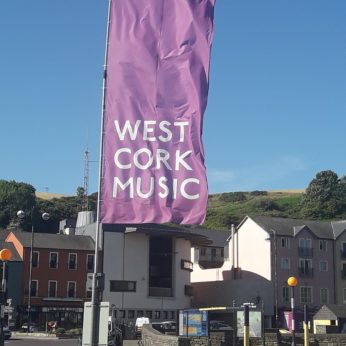Composer: Sally Beamish (b. 1956)
Performance date: 05/07/2018
Venue: St. Brendan’s Church
Composition Year: 2011
Duration: 00:18:32
Recording Engineer: Ciaran Cullen, RTÉ
Instrumentation Category:String Quartet
Artists:
Elias Quartet (Sara Bitlloch, Donald Grant [violins], Simone van der Giessen [viola], Marie Bitlloch [cello]) -
[quartet]

Donald
Grant, the second violinist in the Elias, is well known as a traditional
Scottish fiddle player. I have
incorporated this skill into a quartet work, drawing on Donald’s Gaelic roots.
The second violin range of a quartet is similar to that used by traditional
fiddle, inhabiting the throaty, rich sound world of the lower strings, and the
distinctive clarity of the upper strings in their lower positions. This leaves
the first violin to explore the heights of the E string, so that the two
violins are almost like different instruments.
I
wrote part of the quartet in a cottage overlooking the machar of the Isle of
Harris, in the Outer Hebrides, listening to Britten’s quartets in between
working. These works always remind me of my former life as a viola player, and
the wind blowing through the reed beds at Snape; a very different, but equally
windswept, salt-scented wilderness.
The
reed has many different associations. The
Reed of God: a Christian metaphor for Mary: the channel through which the
spirit is breathed. The accursed reed
of Celtic belief: the reed through which Jesus was given vinegar to drink, on
the cross. And the reeds used in the making of wind instruments, including the
bagpipe and accordion. The Sufi poet Rumi describes the reed flute as a symbol
of longing and separation: the reed, separated from its home, utters a
heart-breaking lament.
Reed Stanzas takes the form
of variations on a Celtic-inspired theme announced by the second violin, which
opens and closes the work in the manner of Pibroch (the classical music of the
Highland bagpipe). I have explored the intricate ornamentation used in Pibroch,
highlighting its similarities to birdsong, and to Arabic reed flute (ney)
playing. The piece also refers to the multiple reeds of the accordion (these
days made of metal) – an instrument used in traditional music of many cultures.
The idea of the loneliness and vastness of landscape underpins the quartet, while
each variation, or stanza, has its own metre and mood.
Reed
Stanzas was commissioned by BBC Radio 3 and first performed on July 25th, 2011
in Cadogan Hall, London, by the Elias String Quartet, as part of the BBC Proms
Chamber Music Series.
Copyright © 2025 West Cork Music. All rights reserved.
Designed and developed by Matrix Internet